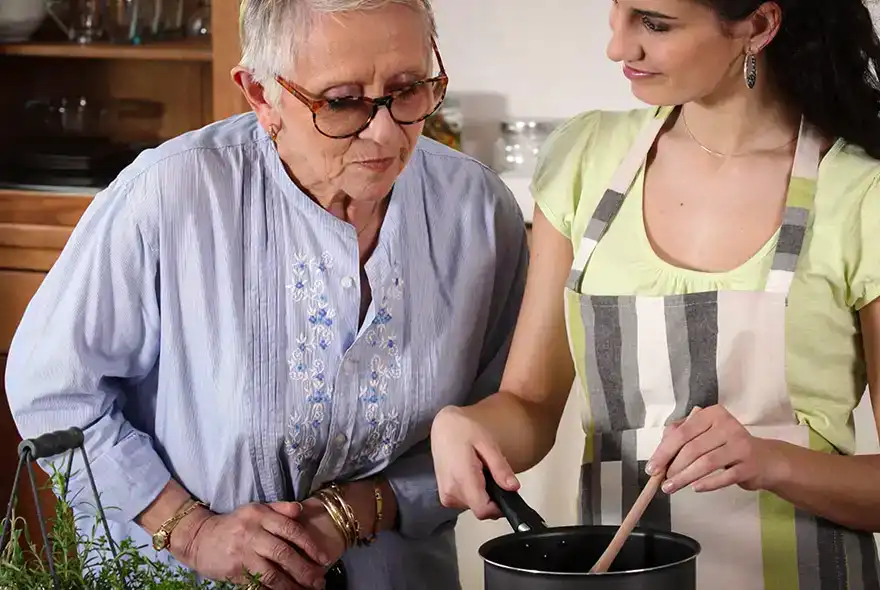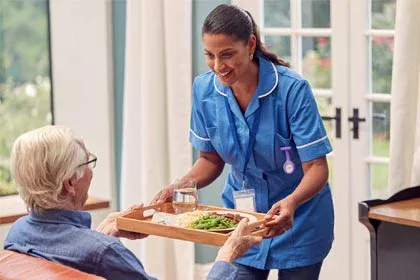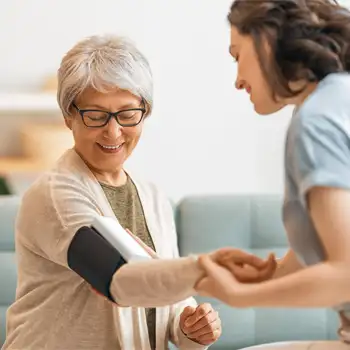As adults grow older, it has been proven beneficial to reside in a setting that is cozy and recognizable. However, maintaining daily household chores can be challenging for elderly individuals and those facing disabilities, restricted movement, or other obstacles.
Allevia Home Care provides skilled and caring staff to assist older individuals or other disabled adults who prefer to continue living in their own homes, even though they might struggle to handle all the maintenance tasks by themselves. A kind-hearted approach involves organizing a care assistant to help with regular duties such as meal preparation, shopping, tidying up, washing clothes, and taking care of the household in general.

What Is Included with Homemaking Services
Homemaker services encompass a range of tasks that can be tailored to meet the specific needs of elderly individuals or those with disabilities within their homes. These services are designed to provide comprehensive assistance with daily tasks and support their independent living. These services not only ensure a clean and organized living space but also foster a sense of companionship and emotional support for seniors or disabled persons who might otherwise feel isolated.
Staff at Allevia Home Care are pleased to provide help with domestic chores that significantly impact the lives of elderly individuals and disabled adults.

These tasks often include:
- Grocery shopping
- Meal preparation
- Kitchen cleaning and organization
- Cleaning and organizing bathrooms
- Vacuuming and sweeping
- Laundry and changing bed linens
- Ironing
- Eliminating tripping hazards and making the home environment safe
- Assistance with pet or plant care
Benefits of Homemaking Services from Allevia Home Care
Allevia Home Care offers a range of domestic help services that can substantially enhance the quality of life of individuals in their own homes.
With a variety of qualified homemakers available for hire across our service area, local residents can benefit from professional-grade domestic assistance scaled to handle their specific household needs.
Allevia Home Care takes pride in building lasting relationships and familiarizing themselves with the nuances of client homes to best pitch in wherever needed. Their supportive presence lets those we serve focus energy on personal priorities rather than allocating multiple hours every week to obligatory home-based chores alone.
Relatives depend on Allevia Home Care to provide dedicated and proficient caregivers who derive genuine pleasure from attending to the small details that enhance the comfort of elderly or disabled individuals.
If you or a loved one are in need of daily assistance, please contact Allevia Home Care to help bring some comfort and peace of mind into the lives of you and your loved ones.
Frequently Asked Questions
What is the importance of personal care for seniors’ well-being?
Personal care is crucial for seniors as it helps them maintain their dignity, independence, and overall well-being. It can be challenging for seniors to accept help with personal tasks after a lifetime of managing independently. However, personal care can create a safe environment when dealing with personal tasks, listen to the wishes of the elderly patient, adapt to the preferences and needs of the patient, prepare the medicines and other things that support wellness, promote the quality of life of seniors, people with disabilities, and those suffering from illnesses in need of home care, and is a part of healthy living. Personal care also promotes good mental health, helps avoid skin issues, keeps up with foot care, prevents dental problems, stops body odor, maintains a healthy appearance, and helps detect health complications.
What Happens If an Elderly Person Has No One to Care for Them?
When elderly individuals find themselves without a caregiver, various support services can step in to provide assistance and ensure their well-being. These services may include:
- Government Assistance Programs: Many governments have social welfare programs designed to support elderly citizens. These programs may offer financial aid, housing assistance, and access to healthcare services.
- Non-Profit Organizations: Numerous non-profit organizations focus on the welfare of the elderly. These organizations often provide services such as meal delivery, transportation, and companionship programs.
- Community Resources: Local communities may offer resources such as senior centers, where the elderly can engage in social activities, receive health check-ups, and access educational programs.
What Is Personal Care?
Personal care is one of the most common types of in-home care. Generally, this type of care is meant for individuals with chronic health conditions, physical disabilities, or difficulties with strength, coordination, and mobility. Care will typically include a combination of tasks and activities, which are designed to ensure the individual’s safety, comfort, and well-being.
What health challenges may arise for elderly individuals without proper care?
Elderly individuals without proper care may face various health challenges that can impact their overall well-being. These challenges include:
- Malnutrition: Inadequate access to nutritious meals can lead to malnutrition, affecting physical health and cognitive function.
- Untreated Medical Conditions: Without proper care, chronic medical conditions may go untreated, exacerbating health issues and reducing the individual’s quality of life.
- Increased Risk of Falls: Lack of assistance and supervision may elevate the risk of falls, resulting in injuries that can further compromise the individual’s health.
How quickly can Allevia Home Care start care after my initial inquiry?
In most cases we can begin senior care services within 1 week of first contacting our agency. We strive to respond promptly to urgent senior assistance requests.
What regions do you serve for in-home care?
We currently provide caregiver services across Aurora, Denver, Colorado Springs and Counties: Adams, Douglas, El Paso, Elbert, Jefferson.

